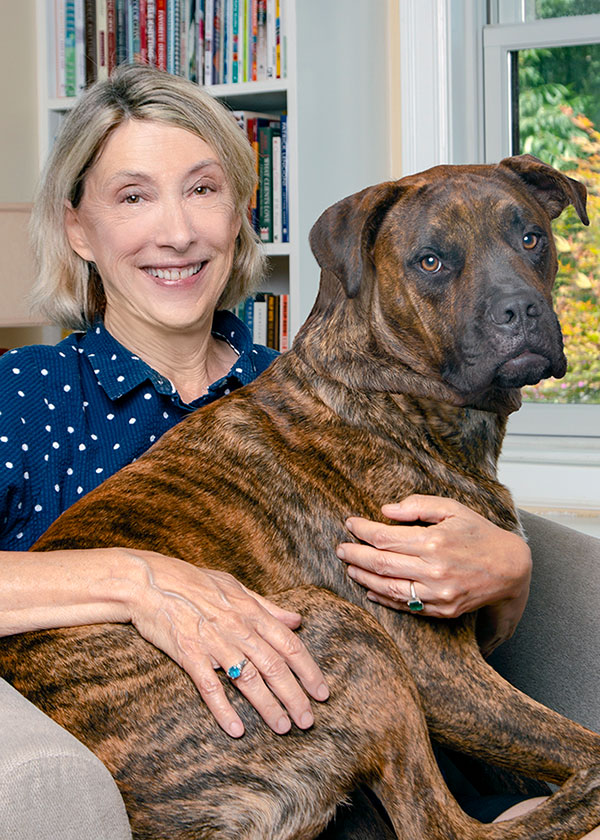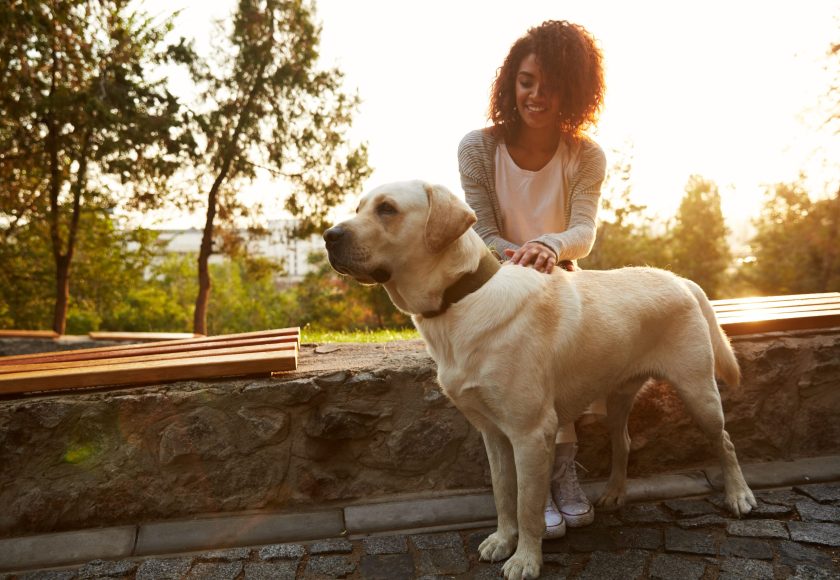The holidays can be loud, busy, and a little overwhelming—for people and dogs. If your family includes a service dog (or you’re considering applying for one), December brings extra questions:
- How do we handle big family gatherings?
- What if people keep trying to pet the dog while they’re working?
- Is it okay to wrap gifts “for the dog”?
At Putnam Service Dogs, we see how much joy the holidays can bring to our service dogs in training and the people they support. We also know that a little planning goes a long way toward keeping everyone—two- and four-legged—feeling safe and respected.
Here are some simple, family-friendly tips to help you enjoy the season together.
1. Set the Stage Before Guests Arrive
Whether you’re hosting dinner or a casual drop-in, it helps to set expectations ahead of time.
- Let guests know a service dog will be present. A quick note in the invite or group text (“You’ll also meet [Dog’s Name], our service dog. Please don’t call, feed, or pet them unless we say it’s okay.”) goes a long way.
- Share the “no distractions” rule. Service dogs need to stay focused on their person’s safety and needs, even when the room is full of food and relatives.
- Create a quiet “off-duty” space. Set up a bed or crate in a low-traffic room, stocked with water and a favorite toy, so your service dog has a safe place to take breaks.
For families with a Putnam Service Dog pup (or one of our future teams in training), this kind of planning helps protect the bond we’ve helped build through many months of training.
2. Practice Holiday “Crowd Skills” in Small Doses
Holiday gatherings can be a lot: people talking over each other, kids running, doorbells, plates clattering, wrapping paper everywhere.
If your service dog is newer to this environment:
- Start small. Introduce them to shorter, quieter visits before the big family party.
- Use strategic positioning. Sit where your service dog has space to settle beside or under the table, away from foot traffic.
- Watch for stress signals. Excessive panting, lip licking, yawning, scratching, or pacing can mean it’s time for a break in that quiet space you prepared.
Our trainers at Putnam build these skills gradually with the dogs in our program—holiday success is really just everyday training, with more decorations.

3. Travel Smart: Routines on the Road
If you’re traveling with a service dog, your person–dog team is crossing multiple worlds in a short amount of time. A few tips:
- Keep the schedule as familiar as possible. Try to maintain feeding, bathroom breaks, and “down time” close to your normal routine.
- Pack a “comfort kit.” Include food, water, bowls, medications, harness/vest, poop bags, favorite toy, and a blanket or bed that smells like home.
- Advocate early and calmly. Whether it’s a hotel, relative’s house, or restaurant, calmly let staff know you’re accompanied by a service dog and where you’d like to sit so the dog can settle safely.
When our Putnam Service Dogs graduate and head into the world, we remind their people: you’re allowed to ask for what you and your service dog need. That’s part of what donors make possible—the training and support that give people the confidence to advocate for themselves.
4. Service Dog Etiquette for Guests (and Curious Kids)
Most people mean well—they’re just excited to meet a very good dog. You can help them help you with a simple “etiquette script.”
For adults:“This is [Dog’s Name], my service dog. They’re working today, so please don’t pet, talk to, or feed them unless I say they’re off duty.”
For kids:“You can say hi to me first, and I’ll tell you if my dog is ready for a hello. When their vest is on, they’re doing an important job.”
You can print or text a short “meet my service dog” card to family and friends if that feels easier.
At Putnam Service Dogs, we talk a lot about how community awareness protects our teams. When donors support us, they’re not just funding training—they’re also helping us educate the public on how to honor those working partnerships.
5. Gift Etiquette: Fun for Dogs, Respectful of the Job
It’s natural for people to want to spoil a service dog during the holidays. A few guidelines:
- Ask before gifting. Some dogs have dietary restrictions or specific training tools they use. Most service dogs have been weaned from treats, so don’t need bags of treats.
- Skip noisy, soft, or over-stimulating toys. Loud squeakers, flashing lights, or strong scents can make it harder for the dog to stay calm in a busy environment. Soft toys may be ingested, and therefore dangerous for the dog. They’re very cute, but better to skip them.
- Think “support the team.” Gift ideas that help the partnership—like durable leashes, hard chewing toys (approved by the handler), or donations in the dog’s honor—are usually appreciated.
A lovely option:
“Instead of buying [Dog’s Name] a toy, I made a donation to Putnam Service Dogs so another rescue dog can start their journey to becoming a service dog.”
That’s a gift that keeps the mission moving.
6. Make Space for Rest—for Everyone
The holidays are emotional. There may be grief, fatigue, or anxiety alongside the joy. Your service dog feels that, too.
- Build in quiet evenings with just your household.
- Give your dog true off-duty time at home when it’s safe, so they can simply be a dog—sniffing, napping, playing.
- Give yourself permission to leave early or say no to events that feel like too much—for you or your dog. As soon as you dog shows he’s stressed, remove him from the situation. Immediately.
- We match our highly trained rescue dogs with people living very hard stories. The holiday season can heighten both joy and pain. It’s okay to make choices that protect your team’s well-being.
How Donors Make These Moments Possible
Every calm holiday dinner, every safe trip to Grandma’s, every child who sees their paren happier, more successful in navigating their life, and more present—those moments are built on countless hours of training, veterinary care, and support Putnam Service Dogs has given their dogs and their teams..
That’s what our community of donors and volunteers makes possible:
- Rescue dogs carefully evaluated and trained as service dogs.
- People with physical disabilities (other than blindness) and veterans with PTSD receiving their service dogs free of charge.
- Release dogs still going on to provide emotional support or in-home assistance for someone with disabilities when full, public-access service dog work isn’t the right fit.
If this season you’d like to help more families celebrate future holidays with a Putnam Service Dog by their side, you can:
- Make a one-time gift.
- Become a monthly donor to support ongoing food, toys, and training.
- Ask about fostering or volunteering in the new year.
Happy howl-idays from all of us at Putnam Service Dogs. May your season be calm, cozy, and full of tail wags.





